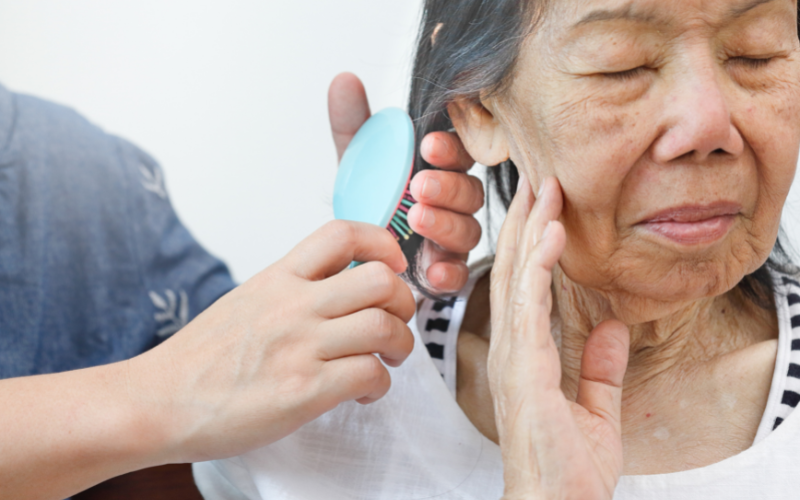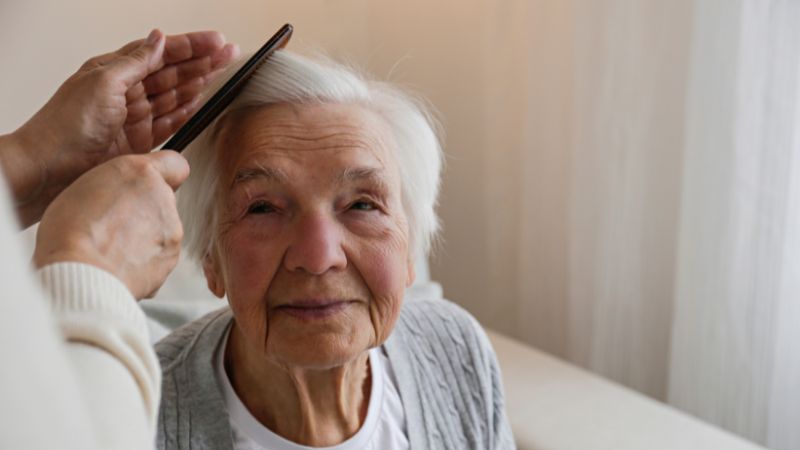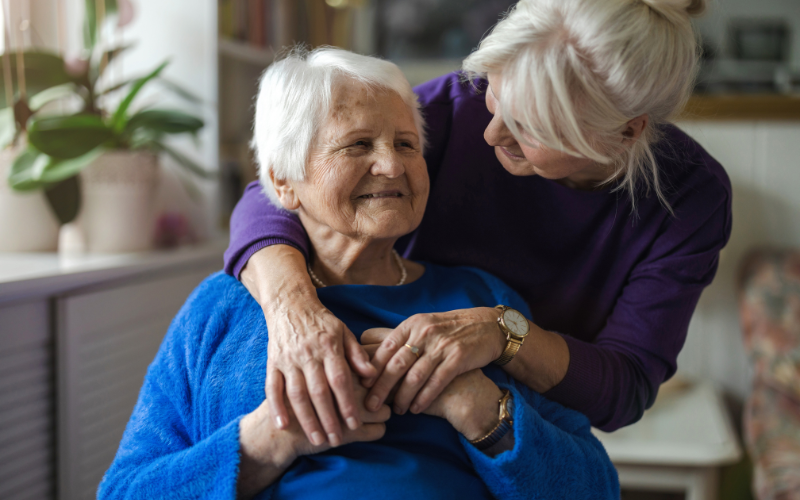
Seniors with Alzheimer’s disease will eventually need assistance with personal hygiene tasks. Self-care activities, like bathing, toileting, and grooming may be impossible for them to perform independently. Dementia caregivers who follow these tips will help seniors stay clean and comfortable.
Alzheimer’s disease progresses slowly, destroying memory and thinking skills and the ability to perform basic life activities, like grooming or bathing. As the disease advances over the years, seniors become increasingly reliant on others, ultimately depending fully on caregivers to complete daily tasks.
Seniors in the middle stage of Alzheimer’s disease will need a significant amount of help with personal care tasks. Problems with bowel and bladder control emerge as a result of the disease. Caregivers must help these seniors with toileting and stay hygienic to prevent infections.
Older adults in the late and most severe stage of Alzheimer’s disease cannot independently perform personal care activities. Around-the-clock assistance with personal care tasks will be necessary, as they experience changes to their physical abilities, such as walking to the bathroom and sitting.
Alzheimer’s caregivers must assist their elderly care recipients with personal care and grooming activities. But seniors may feel embarrassed undressing in front of caregivers or become angry that they cannot perform personal care tasks themselves. Caregivers can follow these tips for better results.
1. Tips for Bathing
Bath time can be a difficult time for both the senior and caregiver. Older people with dementia might feel afraid of the water or of slipping on the bathroom floor. Rather than argue about the need to bathe, matter-of-factly tell the senior, “It’s time for bath.”
Prioritize safety in the bathroom. Never leave a confused dementia patient alone in the shower. Place a non-slip mat in the tub and on the bathroom floor. Install safety bars in the shower and along the walls of the bathroom to offer the senior a stable grip while standing.
A shower chair is beneficial for seniors who are unsteady on their feet and at risk for falling. Before the senior enters the tub, check the water temperature. Ensure the bath water is not too hot or too cold. If possible, bathe the senior using a hand-held shower head.
Prioritize comfort by bathing the elderly individual according to their lifelong habits, such as bathing at night or in the morning. Help the senior relax before the bath by playing soft music and ensuring the bathroom is warm and well-lit.
Show the older adult respect by explaining the steps as they occur. Place a towel over the senior’s chest or lap so they feel less exposed, and clean underneath it using a washcloth. Consider a sponge bath if the senior has difficulty entering and exiting the tub.
2. Tips for Dressing
When dressing a senior with Alzheimer’s disease, allow plenty of time. Anxiety and frustration can overcome an aging person who feels rushed. Plus, the dementia patient might already feel frustration when having to choose clothing; forgetting how to wear clothing is another source of irritation.
Caregivers can simplify the process of dressing by presenting two outfits, which gives the dementia patient choices; however, too many clothing options can overwhelm the senior. Opt for clothing that is easy to wear, such as shoes with Velcro fasteners and shirts that button in front.
A dementia patient may wish to wear the same outfit repeatedly. Accommodate the senior by purchasing identical sets of the same clothing. Ensure the senior is dressed appropriately for the weather. Wash undergarments, as poor hygiene can cause urinary tract infections.
Give the senior clear, simple, and short instructions as they dress. Rather than say, “Put on the cardigan,” gently give the older adult step-by-step directions. Say, “Put your arm in the sleeve,” for instance. It’s also helpful to lay out the clothing in the order they should be worn.
3. Tips for Grooming
A well-groomed senior feels confident. But dementia patients can forget how to comb their hair, clip their fingernails, or shave. Caregivers can help by continuing their grooming routines; if the senior had usually gone to a salon, continue the habit. Or, ask a stylist to come to the home.
Allow the senior to use a favorite toothpaste, shaving cream, or makeup. Simple grooming tools, like electric shavers, are safer to use than razors, which can seem threatening. Caregivers might also use a mirroring technique: combing their own hair, then encouraging the senior to comb their hair.
Bathing, dressing, and grooming a senior can be challenging for caregivers, especially when they are met with resistance. If a senior refuses to be bathed by the caregiver, alternate options are available. Older adults may feel more comfortable when a professional from a home care agency provides the bath.
Assisting Hands Home Care services are invaluable for keeping seniors hygienic, which contributes to their overall physical health and emotional well-being. Our home care agency is staffed with dedicated memory caregivers who are trained and experienced in providing dependable senior care.
Typical responsibilities our dementia caregivers perform include providing transportation to doctors’ offices and senior centers, preparing meals to ensure the aging adult eats nutritiously, shopping for groceries, conducting fall-risk assessments, giving medication reminders, and assisting with personal hygiene tasks, like toileting, bathing, dressing, and grooming.
Memory care also includes companionship to reduce feelings of isolation and loneliness. Caregivers hold pleasant conversations, take seniors on safe outings, and play mentally stimulating games. If the senior wanders, we calmly lead them to safety. We de-escalate agitation with positive reinforcement.
Older adults prefer to age in the comfort and familiarity of home, and Assisting Hands Home Care can fulfill that wish. Our comprehensive non-medical dementia care services are designed to promote the health and wellness of Alzheimer’s patients in their own homes.
When your aging loved one is diagnosed with Alzheimer’s disease, make plans for the future. Include Assisting Hands Home Care in your planning and give seniors the level of care they deserve. Our home care services are available to seniors living in Glen Ellyn, IL | Warrenville, IL | Naperville, IL | Westmont, IL | Woodridge, IL | Lisle, IL | Wheaton, IL and the surrounding areas. Call us today at (630) 634-9316 to schedule a consult.














